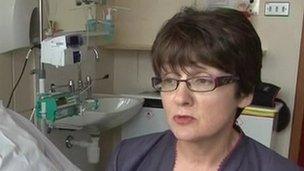Speed essential in treating strokes
- Published

One in six people will suffer a stroke at some point in their lives.
On Stroke Awareness day, the encouraging news is that modern medicine is helping to tilt the balance slightly in favour of the patient, however, speed of response remains vital.
At Craigavon Hospital, staff are blazing a trail when it comes to employing new techniques and new technology.
A new system at the hospital allows consultants to view and direct treatment of patients by video link.
The link is connected to the consultant's laptop computer no matter where they are.
Medical staff at the hospital say the system provides the best possible treatment in the shortest possible time.
'Travel'
When a person suffers a stroke, a rapid response can mean the difference between permanent severe damage and an almost-full recovery.
Dr Patricia McCaffrey said: "This avoids the need for a consultation to travel to the hospital and some of us live quite a distance away.
"Precious time is saved with this tele-medicine link to the consultant's own home."
Angela Hamill suffered a rare form of stroke and has made a remarkable recovery.
"It's called a stroke because it strikes you down immediately. There's no pain, you don't know that you have had a stroke," she said.
"It's usually the people around you that can tell that you have had a stroke so it's up to the other people to react very very quickly."
It is that quick reaction, coupled with medical advances that is ensuring that people like Angela get back to living full and rewarding lives.